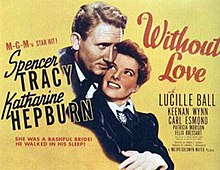
Katharine Houghton Hepburn was an American actress whose career as a Hollywood leading lady spanned six decades. She was known for her headstrong independence, spirited personality, and outspokenness, cultivating a screen persona that matched this public image, and regularly playing strong-willed, sophisticated women. Her work was in a range of genres, from screwball comedy to literary drama, and earned her various accolades, including four Academy Awards for Best Actress—a record for any performer. In 1999, Hepburn was named the greatest female star of classic Hollywood cinema by the American Film Institute.

Spencer Bonaventure Tracy was an American actor. He was known for his natural performing style and versatility. One of the major stars of Hollywood's Golden Age, Tracy was the first actor to win two consecutive Academy Awards for Best Actor from nine nominations. During his career, he appeared in 75 films and developed a reputation among his peers as one of the screen's greatest actors. In 1999, the American Film Institute ranked Tracy as the 9th greatest male star of Classic Hollywood Cinema.
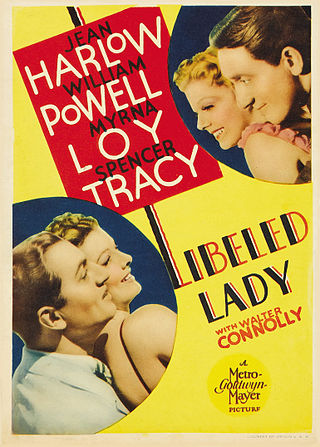
Libeled Lady is a 1936 American screwball comedy film directed by Jack Conway and starring Jean Harlow, William Powell, Myrna Loy and Spencer Tracy. It was written by George Oppenheimer, Howard Emmett Rogers, Wallace Sullivan, and Maurine Dallas Watkins. This was the fifth of fourteen films in which Powell and Loy were teamed, inspired by their success in the Thin Man series.
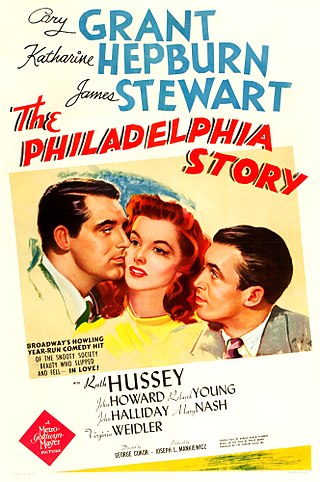
The Philadelphia Story is a 1940 American romantic comedy film directed by George Cukor, starring Cary Grant, Katharine Hepburn, James Stewart, and Ruth Hussey. Based on the 1939 Broadway play of the same name by Philip Barry, the film is about a socialite whose wedding plans are complicated by the simultaneous arrival of her ex-husband and a tabloid magazine journalist. The socialite character of the play—performed by Hepburn in the film—was inspired by Helen Hope Montgomery Scott (1904–1995), a Philadelphia socialite known for her hijinks, who married a friend of playwright Barry.

Guess Who's Coming to Dinner is a 1967 American romantic comedy-drama film produced and directed by Stanley Kramer, and written by William Rose. It stars Spencer Tracy, Sidney Poitier, and Katharine Hepburn, and features Hepburn's niece Katharine Houghton.

Father of the Bride is a 1950 American comedy film about a man trying to cope with preparations for his daughter's wedding starring Spencer Tracy, Joan Bennett, and Elizabeth Taylor. Directed by Vincente Minnelli, it was adapted by Frances Goodrich and Albert Hackett from the 1949 novel by Edward Streeter. Father of the Bride was nominated for Academy Awards for Best Picture, Best Writing, Screenplay, and Best Actor in a Leading Role.
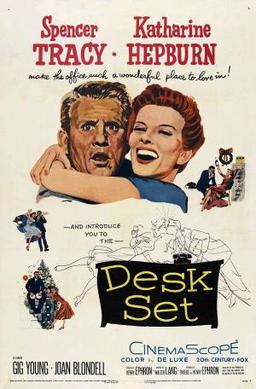
Desk Set is a 1957 American romantic comedy film directed by Walter Lang and starring Spencer Tracy and Katharine Hepburn. The screenplay was written by Phoebe Ephron and Henry Ephron from the 1955 play of the same name by William Marchant.
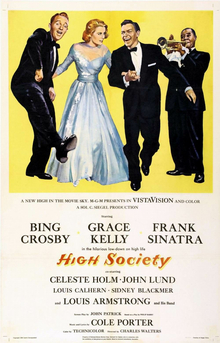
High Society is a 1956 American musical romantic comedy film directed by Charles Walters and starring Bing Crosby, Grace Kelly, and Frank Sinatra. The film was produced by Sol C. Siegel for Metro-Goldwyn-Mayer, and shot in VistaVision and Technicolor, with music and lyrics by Cole Porter.

Ziegfeld Follies is a 1945 American musical comedy film released by Metro-Goldwyn-Mayer, primarily directed by Vincente Minnelli, with segments directed by Lemuel Ayers, Roy Del Ruth, Robert Lewis, and George Sidney, the film's original director before Minnelli took over. Other directors that are claimed to have made uncredited contributions to the film are Merrill Pye, Norman Taurog, and Charles Walters. It stars many MGM leading talents, including Fred Astaire, Lucille Ball, Lucille Bremer, Fanny Brice, Judy Garland, Kathryn Grayson, Lena Horne, Gene Kelly, James Melton, Victor Moore, William Powell, Red Skelton, and Esther Williams.

Pat and Mike is a 1952 American romantic comedy film starring Spencer Tracy and Katharine Hepburn. The movie was written by Ruth Gordon and Garson Kanin, and directed by George Cukor. Cukor directed The Philadelphia Story (1940) with Hepburn, and Cukor, Gordon and Kanin teamed with Hepburn and Tracy again for Adam's Rib (1949). Gordon and Kanin were nominated for the 1952 Academy Award for Best Original Screenplay for their work on Pat and Mike.

State of the Union is a 1948 American drama film directed by Frank Capra about a man's desire to run for the nomination as the Republican candidate for President, and the machinations of those around him. The New York Times described it as "a slick piece of screen satire...sharper in its knife-edged slicing at the hides of pachyderm schemers and connivers than was the original." The film was written by Myles Connolly and Anthony Veiller and was based on the 1945 Russel Crouse, Howard Lindsay Pulitzer Prize-winning play of the same name.

Keeper of the Flame is a 1942 American drama film directed by George Cukor, and starring Spencer Tracy and Katharine Hepburn, released by Metro-Goldwyn-Mayer (MGM). The screenplay by Donald Ogden Stewart is adapted from the 1942 novel Keeper of the Flame by I. A. R. Wylie. Hepburn plays the widow of a famous civic leader who has died in an accident. Tracy portrays a former war correspondent who intends to write a flattering biography of the dead man, only to find that his death is shrouded in mystery. Screenwriter Stewart considered the script the finest moment of his career, feeling vindicated by the assignment as he believed that Hollywood had punished him for years for his political views. Principal filming began in the last week of August 1942, four months after the release of the novel, published by Random House. The picture was filmed on a sound stage, with no location shooting. Hepburn had already begun a relationship with Tracy, and his heavy drinking led her to become his vigilant guardian during the filming.
The comedy of remarriage is a subgenre of American comedy films of the 1930s and 1940s. At the time, the Production Code, also known as the Hays Code, banned any explicit references to or attempts to justify adultery and illicit sex. The comedy of remarriage with the same spouse enabled filmmakers to evade this provision of the Code. The protagonists divorced, flirted with strangers without risking the wrath of censorship, and then got back together.
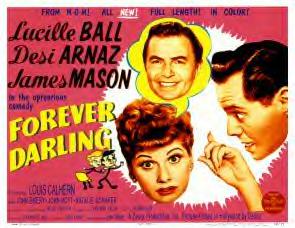
Forever, Darling is a 1956 American fantasy romantic comedy film directed by Alexander Hall, written by Helen Deutsch, and starring Lucille Ball, Desi Arnaz, and James Mason. In the film, Ball stars as a wife who tries to save her struggling marriage to a chemical engineer (Arnaz) with the help of her guardian angel (Mason). Louis Calhern and Natalie Schafer co-star in supporting roles.
John Wesley Dawn was an American make-up artist whose career spanned 37 years and over 200 films.
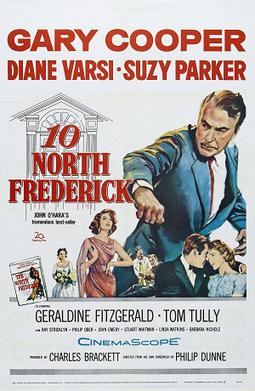
Ten North Frederick is a 1958 American drama film in CinemaScope written and directed by Philip Dunne and starring Gary Cooper. The screenplay is based on the 1955 novel of the same name by John O'Hara.

Easy to Wed is a 1946 Technicolor American musical comedy film directed by Edward Buzzell, and starring Van Johnson, Esther Williams, Lucille Ball, and Keenan Wynn. The screenplay by Dorothy Kingsley is an adaptation of the screenplay of the 1936 film Libeled Lady by Maurine Dallas Watkins, Howard Emmett Rogers, and George Oppenheimer.
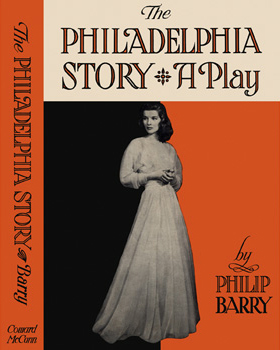
The Philadelphia Story is a 1939 American comic play by Philip Barry. It tells the story of a socialite whose wedding plans are complicated by the simultaneous arrival of her ex-husband and an attractive journalist. Written as a vehicle for Katharine Hepburn, its success marked a reversal of fortunes for the actress, who was one of the film stars deemed "box office poison" in 1938.
Without Love may refer to:

Wanda Tettoni was an Italian actress and voice actress.
